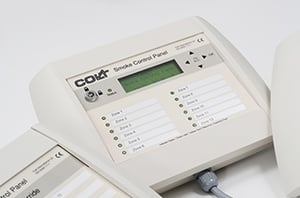 Smoke ventilation systems today require sophisticated control systems with highly complex sequences of operation. HVAC control systems could be seen as a viable solution, as they can be extremely flexible and offer a high degree of programmability. However, while they may be adequate for simple applications, there are a number of issues that mean they do not deliver on all the functionalities needed for more complex schemes.
Smoke ventilation systems today require sophisticated control systems with highly complex sequences of operation. HVAC control systems could be seen as a viable solution, as they can be extremely flexible and offer a high degree of programmability. However, while they may be adequate for simple applications, there are a number of issues that mean they do not deliver on all the functionalities needed for more complex schemes.
Here are 5 reasons why:
1. Unreliability in occasional use
Smoke ventilation systems are only expected to operate if smoke is detected and will be unused for long periods of time. Most importantly, they must work first time, every time. HVAC systems are not designed for this and can be temperamental when not continuously in use. This means that they may not be sufficiently reliable for smoke ventilation control.
2. Inability to operate at high temperatures.
The interface devices out on the network (I/O devices) are rarely designed to operate at high temperatures, which would present obvious problems in a fire.
3. Lack of error diagnostics reporting.
HVAC systems rarely perform basic error checking routines to enable fault or communication error diagnostics to be reported across the network.
4. Vulnerability to interference.
BMS or PLC based control systems can be more vulnerable to errors caused by background interference from other electrical devices in the building. They can also be too sensitive for smoke control purposes.
5. Insufficient failsafe capability.
The I/O devices are rarely programmable, so if the HVAC system loses contact with the main panel, there is no designated failsafe state. This means that if the device loses communication with the main panel and is controlling the extract fans on a life safety system, the fans may not continue to run. This is a crucial issue: smoke control systems are reliant on a degree of failsafe capability from the system that controls them.
Conclusion
HVAC systems are not as reliable and robust as they need to be for smoke control applications; they require careful adaptation and rigorous testing to ensure that their inability to acquire a degree of failsafe operation is overcome.
 Conor Logan is Associate Technical Director of Colt UK, Smoke and Climate Control Division. Conor designs innovative smoke control and HVAC systems and is also Chairman of the Smoke Control Association.
Conor Logan is Associate Technical Director of Colt UK, Smoke and Climate Control Division. Conor designs innovative smoke control and HVAC systems and is also Chairman of the Smoke Control Association.


